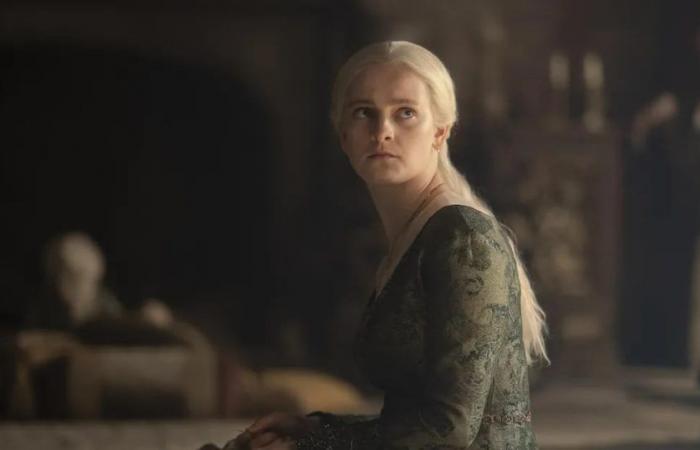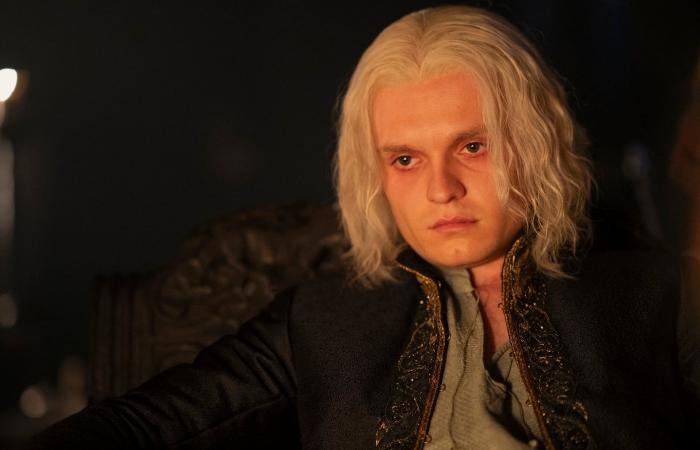One week ago, The dragon house returned to the Max and HBO screen and renewed the furor for the prequel to game of Thrones released almost two years ago. And after what happened in a first episode with a gripping ending, in the second installment we were able to see the consequences of the act that made it clear that the Dance of Dragons is imminent.
Below, a review of the highlights of the second episode of this new season. Rhaenyra, the cruel is the name of the chapter directed by Clare Kilner and written by Ryan Condal, showrunner of this prequel game of Thrones.
If they don’t want spoilers, this is the time to abandon the note until further notice. We are waiting for you here when you have seen the episode.
All scrambled
After the murder of his heir, King Aegon destroys everything in his path. In a fit of fury, he declares war to the four winds and claims that Rhaenyra, her half-sister who also claims the Iron Throne for herself, is laughing at him.
This thirst for immediate revenge contrasts what happens with other protagonists inside the Red Fortress, whose inhabitants still experience with dismay the entry of two strangers in the middle of the night to end the life of one of the princes.
Alicent, punished by the gods? King Aegon’s mother continues to show her complexity as a character. At the beginning of the episode, she mourns not so much the death of her grandson, but the suffering that her daughter Helaena will have to bear. “The gods punish me,” she tells her father while she is grieving. It will be she, along with the king’s wife/sister, who will place her body to show the subjects the suffering that the crown goes through. In parallel, her relationship with Sir Criston Cole becomes increasingly unpredictable, something that becomes clear in the final moments of the episode, in which anger and desire merge like the steel of the sharpest sword.
Otto Hightower, displaced. After the death of little Jaehaerys, the Hand of the King suggests patience and temperance in the midst of the storm. “Let them see the boy,” he tells his grandson when he wants to attack the blacks without hesitation. “He will have his war, your majesty,” he promises her, but clarifies that “the kingdom must see the pain of the crown” and that the memory of his son will be worth more than “a thousand soldiers.” At this point, each of Hightower’s interventions leaves some material to be cut and some masterful definitions of life in Westeros. However, on his face you can already see what also seems inevitable: his relationship with Aegon hangs by a thread and it is a matter of time before the difference in styles dynamizes the bond between the king and his Hand.
Helaena, a mystery not yet revealed. Aegon’s sister and wife, who until now had not had any major impact on the plot, appears as an enigmatic figure with a still hidden, hidden power. “I don’t want them around, I don’t know them,” the young woman tells her mother when Alicent must convince her for both of them to take part in a mortuary procession behind Jaehaerys’ body. That scene is one of the most tense in the entire episode and also shows the distance between the crown and the people. Helaena ends up on the verge of a panic attack, hugging her mother and desperate for the plebeian demonstrations that get closer and closer when the march is interrupted.
Rhaenyra, kingslayer? “Behold the work of Rhaenyra Targaryen,” is heard in the streets of King’s Landing as Jaehaerys’ body and head travel through the city. That echo reaches the queen of the black side herself, who learns of the death of Aegon’s son and immediately understands that her uncle-husband is part of the problem. The dialogue between the two in which Rhaenyra tells Daemon that she has hurt her and that she can no longer trust him is another of the great counterpoints of the episode. That dialogue also connects to the beginning of the series by remembering King Viserys and his decision to give the throne to his daughter before his brother. After that, Daemon chooses to retreat and leaves with his dragon to an unknown direction.
Criston Cole, with accumulated power. The Lord Commander of the Royal Guard is gaining more and more prominence. He not only approaches King Aegon and his brother, Aemond, but also becomes directly involved in the war by manipulating Sir Arryk into posing as his traitor twin (Erryk, allied to the blacks) and killing Rhaenyra. The irrepressible hatred of that former love seems to be his main motivation and that obsession becomes his main capital within the crown. Finally, Cole will receive the insignia that King Aegon asks for from his grandfather. “My new hand will be a fist of steel,” says the monarch before handing over the position to his most loyal servant.
Aemond, between action and fragility. Aegon’s brother is another of the most magnetic characters in Westeros and his every movement paralyzes. After being an absolute reference in designing the military response to Jaehaerys’ murder and finding the clues that lead to discovering the truth about what happened, he stars in one of the most interesting scenes. In a brothel, and curled up in the lap of a prostitute, he brags about Daemon’s plan to kill him during the night and claims that his rival is afraid of him. “I am proud that he considers me an enemy and seeks to kill me while I sleep. Furthermore, he confesses: “I regret the affair with Luke. “I lost my temper that day and I regret it.”
Mysaria and a key fact. The informant, nicknamed White Worm, is still imprisoned in Dragonstone and after Daemon’s departure she is visited by Rhaenyra, who seeks to complete the puzzle behind the murder (by mistake and by order) of Jaehaerys. After some hesitation, the queen decides to free her and finds a place for her on a boat close to leaving her. However, when she is about to reach the port she crosses paths with Sir Arryk as he goes to end Rhaenyra’s life. That decisive moment seems to be key to what will come in the next episodes.
Aegon, thirsting for blood, not ink. The green king is another character that takes your breath away in each new intervention. After his initial fury, the indifference he shows towards his sister-wife and his personal revenge against his son’s murderer, he stars in another of the definitive scenes of the episode by asking his grandfather to leave his place as Hand of the King. Otto Hightower defines him as an “irresponsible egoist” and an “insolent puppy” after Aegon decided to hang all the ratcatchers in the castle. “I want to spill blood, not ink,” says the king to distance himself from his father’s style. At that moment, a new order begins to be drawn and Criston Cole becomes the monarch’s trusted man.
“One soul in two bodies”
The end of the episode comes after Arryk and Erryk face each other to the death in Rhaenyra’s own chambers. Alerted by Mysaria, the Green Queen’s guardian twin arrives in time to disrupt his brother’s plans. The fight between the two has the added bonus of not knowing who is who, but when it’s all over it becomes clear that they are “one soul in two bodies”, as Arryk had predicted. After stopping his brother from murdering Rhaenyra, Erryk takes his own life in front of the monarch and joins his brother seconds after killing him with his own sword.
However, the outcome of the episode is not that. After that engaging scene we see Otto and Alicent Hightower in full dialogue. Aegon’s grandfather says that the king “does not see the long term” and points to the young men as “peacocks” who do not have the temperance necessary to rule. Her daughter advises him to leave for a while and then return stronger and when she wants to confess her sins, her father prefers not to listen to her. Finally, Alicent returns to her bedroom, sees her son Aegon crying, and chooses to meet Criston Cole again. Where there was fire…







